Zephyranthes simpsonii
Fl. South. U.S. ed. 2 repr. 2, 696. 1892.
Leaf blade dull green, to 4 mm wide. Spathe (1.7–)2–4(–4.2) cm. Flowers erect; perianth mostly white proximally, often strongly infused pink or purple distally, more so with age, funnelform, (4–)4.3–8.5(–10) cm; perianth tube green, (1.4–)1.6–3.3(–4) cm, increasing in diam., ca. 1/3 or more perianth length, ± equaling or seldom less than (3/4–11/4) filament length, ± equaling (2/3–11/4) spathe length; tepals slightly diverging, rarely reflexed; stamens diverging, appearing equal; filaments filiform, (1.5–)1.6–3(–3.2) cm; anthers 3–6(–8) mm; style longer than perianth tube; stigma 3-fid, usually among or below anthers, rarely exserted more than 1 mm beyond anthers; pedicel absent or to 0.6(–1.5) cm and shorter than spathe. 2n = 48.
Phenology: Flowering late winter–spring (Feb–May).
Habitat: Peaty-sandy soil, coastal plains, rarely piedmont
Elevation: 0–100 m
Distribution

Ala., Fla., Ga., Miss., N.C., S.C.
Discussion
Of conservation concern.
Although the perianth of Zephyranthes simpsonii was originally described as pale pink, white forms are quite common. Any of the North American white-flowered species of Zephyranthes may be variously flushed with pink, increasingly so with age.
Selected References
None.